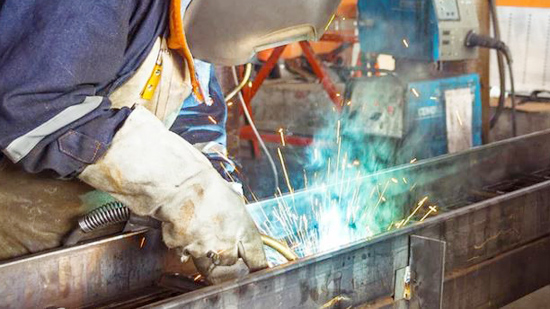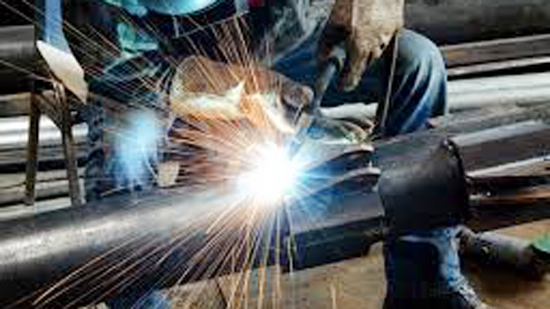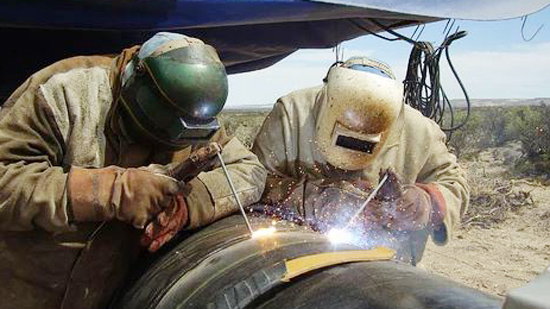The maritime industry plays a crucial role in global trade and transportation, driving the demand for skilled marine welders. As we look ahead to 2024, the need for shipbuilding, maintenance, and repairs is expected to increase significantly. This surge in demand is fueled by the aging of existing vessels, the expansion of maritime infrastructure, and the growing emphasis on sustainability in the shipping industry. Marine welders are essential to ensuring the structural integrity of ships, offshore platforms, and other marine structures, making them indispensable in the maritime sector.
Advancements in marine technology and materials have further elevated the importance of skilled welders in the industry. From working on massive oil rigs to intricate underwater structures, marine welders are required to possess a diverse set of welding techniques and the ability to adapt to challenging work environments. With the projected growth in the marine sector, the demand for highly skilled welders is set to rise, presenting lucrative opportunities for those considering a career in marine welding.
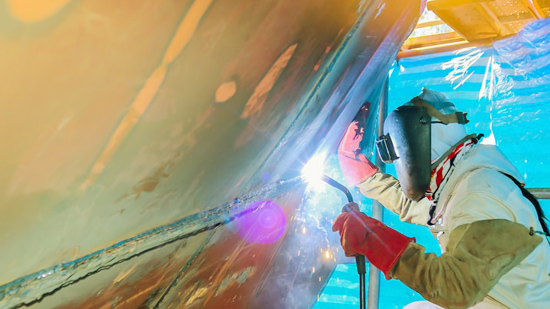
Photo by kgmarinefabrication
In light of these developments, aspiring marine welders can look forward to a promising job market in 2024 and beyond. By honing their welding skills, staying abreast of industry trends, and obtaining relevant certifications, individuals can position themselves for success in this dynamic and rewarding field.
Factors Influencing the Salary of Marine Welders
Several factors contribute to the salary potential of marine welders in 2024. Experience plays a significant role, with seasoned welders commanding higher wages due to their expertise and track record of successful projects. The geographical location of employment can impact salary levels, as regions with high demand for marine welders may offer higher compensation to attract talent. The type of employer, whether working for a shipyard, offshore drilling company, or marine engineering firm, also influences salary negotiations.
Furthermore, the complexity and scale of welding projects can affect earnings, with specialized welding techniques or certifications leading to higher pay rates. In some cases, marine welders may receive bonuses or overtime pay for working in challenging conditions or meeting tight deadlines.
Unionized welders may benefit from collective bargaining agreements that establish minimum salary levels and ensure fair compensation for their work. By considering these factors and negotiating effectively, marine welders can optimize their earning potential in the competitive maritime industry.
To stay ahead in the field, welders can also invest in continuous training and professional development to enhance their skills and qualifications. By expanding their expertise in emerging welding technologies, such as robotic welding or additive manufacturing, welders can differentiate themselves in the job market and command higher salaries in 2024 and beyond.
Average Salary of Marine Welders in 2024
In 2024, marine welders can anticipate a competitive average salary that reflects the specialized nature of their work and the demand for skilled professionals in the maritime sector. While precise salary figures may vary based on individual circumstances, industry data suggests that marine welders can earn a median annual salary ranging from $52000-$60000 in 2024. This income range accounts for factors such as experience, location, industry sector, and additional certifications or qualifications held by the welder.
With the potential for overtime pay, bonuses, and other incentives, marine welders have the opportunity to enhance their earnings beyond the base salary. As the maritime industry continues to evolve and embrace technological advancements, welders who stay current with industry trends and invest in their professional development are well-positioned to command higher salaries and secure stable employment in this dynamic field.
For individuals considering a career in marine welding, understanding the average salary expectations and factors that influence compensation can provide valuable insights into the financial rewards associated with this specialized profession. By leveraging this knowledge and pursuing opportunities for growth and advancement, aspiring marine welders can embark on a fulfilling and prosperous career in the maritime industry.
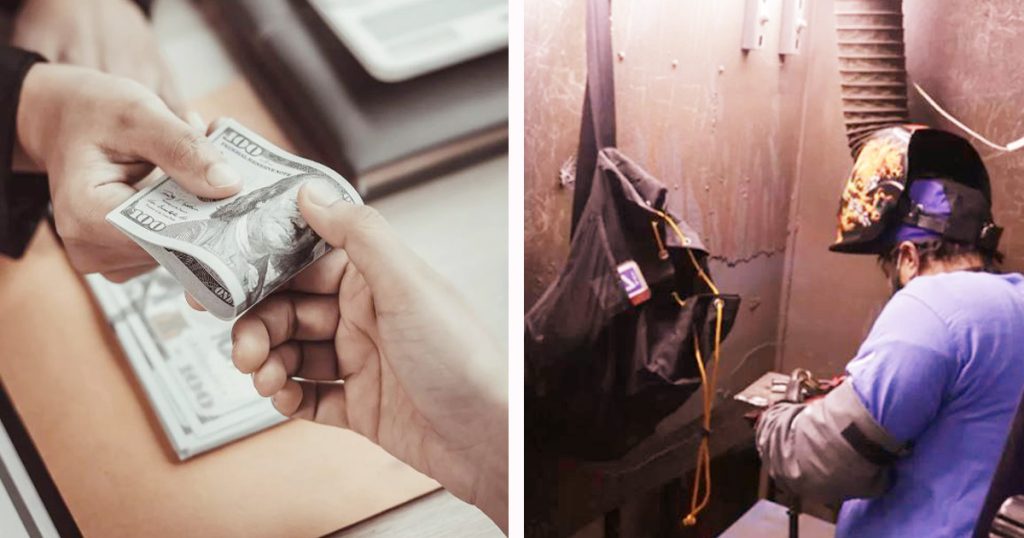
Image by arccaptain & ptt.edu
Benefits and Perks of Being a Marine Welder
Beyond the financial rewards, a career as a marine welder offers a range of benefits and perks that make it a compelling choice for those passionate about welding and the maritime industry. One of the primary advantages is the opportunity to work in diverse and exciting environments, from shipyards and offshore platforms to underwater construction sites. This variety not only keeps the work engaging but also allows welders to expand their skills and experience different aspects of marine welding.
Additionally, marine welders often enjoy job stability and security due to the continuous demand for their services in shipbuilding, repair, and maintenance projects. The specialized nature of marine welding also means that skilled welders are in high demand, providing ample opportunities for career growth and advancement. Many employers offer competitive benefits packages, including health insurance, retirement plans, and paid time off, to attract and retain top welding talent.
The sense of accomplishment that comes from contributing to the construction or repair of vital marine structures, such as ships, submarines, and offshore rigs, is a rewarding aspect of being a marine welder. Knowing that their work plays a crucial role in ensuring the safety and integrity of maritime assets can be a source of pride for welders in this field.
The combination of financial stability, job satisfaction, and professional growth makes marine welding a fulfilling and attractive career choice for welders passionate about the sea.
Essential Skills and Qualifications for Marine Welding
To excel as a marine welder in 2024, individuals must possess a diverse set of skills and qualifications that are essential for success in this demanding field. Proficiency in various welding techniques, such as shielded metal arc welding (SMAW), gas tungsten arc welding (GTAW), and flux-cored arc welding (FCAW), is critical for performing quality welds on different types of metals commonly used in marine construction. A deep understanding of metal properties, heat treatment, and welding processes is also necessary to ensure the structural integrity and durability of welded joints.
Knowledge of maritime regulations and safety protocols is vital for marine welders working in shipyards, docks, or offshore installations. Compliance with industry standards and best practices not only ensures the quality of welding work but also promotes a safe working environment for all personnel involved in marine construction projects.
Additionally, strong problem-solving skills, attention to detail, and the ability to work effectively in team settings are key attributes that contribute to the success of marine welders in their daily work.
In terms of qualifications, most employers prefer marine welders with a high school diploma or equivalent, along with formal training in welding from a technical school or vocational program. Obtaining certifications from reputable organizations, such as the American Welding Society (AWS) or the International Institute of Welding (IIW), can further enhance the credibility and employability of marine welders.
By continuously honing their skills, staying updated on industry trends, and pursuing relevant certifications, welders can build a solid foundation for a successful career in marine welding.
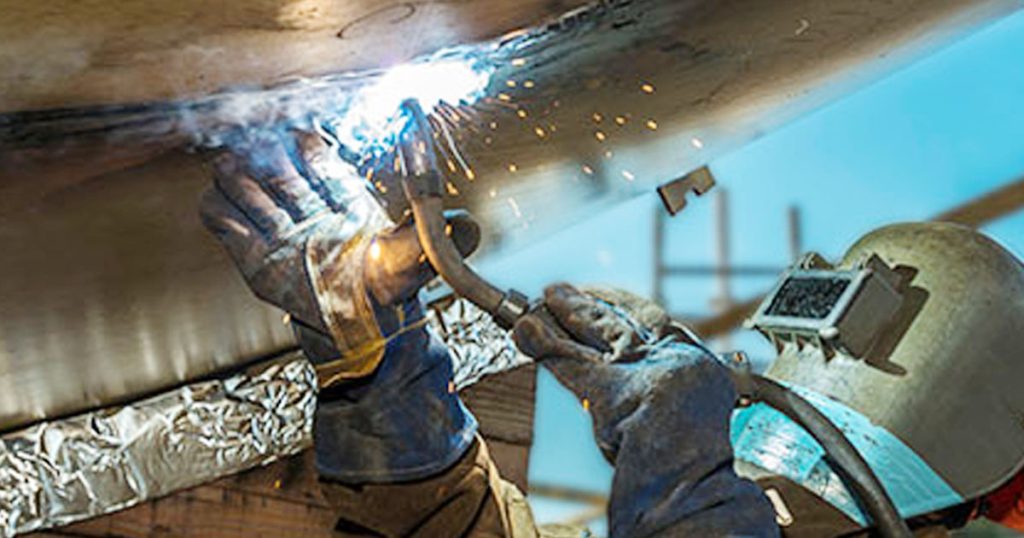
Image by oilnow .gy
How to Become a Marine Welder
For individuals aspiring to become marine welders in 2024, a clear pathway to entry into the field involves acquiring the necessary education, training, and hands-on experience to develop the required skills and expertise. One common route is to enroll in a welding program at a technical school or community college, where students receive instruction in welding theory, techniques, and safety practices. These programs often include practical hands-on training in welding labs or workshops, allowing students to practice their skills under the guidance of experienced instructors.
After completing a formal welding program, aspiring marine welders can pursue certification exams offered by recognized organizations, such as the AWS Certified Welder program, to validate their skills and knowledge in specific welding processes. These certifications not only demonstrate proficiency to potential employers but also open up opportunities for higher-paying positions and career advancement in the welding industry. Gaining practical experience through internships, apprenticeships, or entry-level welding jobs can provide valuable on-the-job training and networking opportunities for aspiring marine welders.
In addition to technical skills, aspiring marine welders should also focus on developing soft skills, such as communication, teamwork, and adaptability, that are essential for success in the workplace. Building a strong professional network within the welding community, attending industry events and conferences, and staying informed about the latest welding technologies and practices can further enhance the career prospects of marine welders in 2024 and beyond. By investing time and effort in their professional development, individuals can embark on a rewarding journey towards becoming skilled and sought-after marine welders.
Job Opportunities and Industries that Hire Marine Welders
Marine welders enjoy diverse job opportunities across various industries that require their specialized skills and expertise in welding. Shipbuilding companies, both commercial and military, represent a significant sector that employs marine welders for constructing new vessels, repairing existing ships, and performing maintenance work on maritime assets. Offshore drilling and exploration companies also hire welders to work on offshore platforms, oil rigs, and subsea pipelines, where welding plays a critical role in ensuring the structural integrity of these installations.
Marine engineering firms specializing in underwater construction, marine transportation, and offshore renewable energy projects rely on skilled welders to carry out welding operations in challenging marine environments. Government agencies, such as the Navy, Coast Guard, and maritime regulatory bodies, offer employment opportunities for marine welders in roles related to ship maintenance, repair, and inspection. With the increasing emphasis on sustainability and eco-friendly marine practices, welders may also find opportunities in industries focused on marine conservation and environmental protection.
In addition to traditional maritime industries, marine welders can explore job prospects in related sectors, such as underwater welding, marine salvage, and marine research, where their welding skills are in demand for specialized projects and operations. By diversifying their skill set and staying open to new opportunities, marine welders can carve out a rewarding career path that aligns with their interests and goals in the dynamic and ever-evolving maritime industry.

Image by nist.gov
Training and Education Options for Aspiring Marine Welders
Aspiring marine welders have access to a range of training and education options that can help them kickstart their careers and develop the necessary skills for success in the field. Technical schools, community colleges, and vocational training centers offer welding programs tailored to the needs of aspiring welders, providing instruction in welding fundamentals, safety procedures, and hands-on practice with welding equipment. These programs typically cover a variety of welding techniques, including arc welding, MIG welding, and TIG welding, to prepare students for the diverse challenges of marine welding.
Specialized welding schools and training facilities focus on marine welding specifically, offering advanced courses in underwater welding, hyperbaric welding, and welding in confined spaces. These programs equip students with the specialized knowledge and practical skills needed to work in demanding marine environments and meet the stringent requirements of marine welding projects.
Additionally, some training providers offer certification preparation courses to help aspiring welders obtain industry-recognized certifications that enhance their employability and earning potential.
For those seeking a more flexible learning approach, online welding courses and virtual training platforms provide convenient options to acquire welding skills remotely and at their own pace. These digital resources cover a wide range of welding topics, from basic welding principles to advanced welding techniques, and may include interactive simulations and video tutorials to enhance the learning experience.
By exploring the diverse training and education options available, aspiring marine welders can tailor their learning journey to suit their preferences and career goals, setting a solid foundation for a successful career in marine welding.
Conclusion
The outlook for marine welders in 2024 is bright, with abundant job opportunities, competitive salaries, and rewarding career prospects awaiting skilled professionals in the maritime industry. As the demand for shipbuilding, repairs, and maintenance continues to grow, so does the need for proficient marine welders who can uphold the structural integrity and safety of marine structures.
By understanding the factors that influence marine welder salaries, honing essential skills and qualifications, and pursuing continuous training and education, individuals can position themselves for success in this dynamic and vital field.
Whether embarking on a new career path or seeking to advance in the welding industry, aspiring marine welders can benefit from the diverse job opportunities, benefits, and perks associated with marine welding. From working on cutting-edge marine projects to contributing to the sustainability of the maritime sector, marine welders play a crucial role in shaping the future of the industry.
By embracing the challenges and rewards of marine welding, individuals can embark on a fulfilling and prosperous journey as skilled welders in the ever-evolving world of maritime construction and repair.

I’m Darrell Julian, the founder, lead writer, and hands-on welding enthusiast behind ArcWeldingPro.com. With more than 15 years of real-world welding experience, I created this platform to share what I’ve learned in the field, in the shop, and in the heat of the arc.

